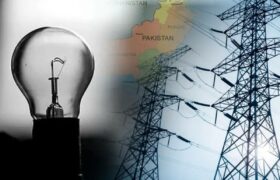“Climate change is a phenomenon that arises due to emissions of greenhouse gases from fuel combustion, deforestation, urbanization and industrialization, resulting in variation of solar energy, temperature and precipitation”.
Pakistan is one of the top countries facing the impact of climate change. The average temperature of Pakistan as projected by various environmentalists has increased in range of 1-3 degree centigrade in various regions of the country. This has led to abnormal melting of glaciers which in longer run may deprive Pakistan of its major water resource. The climate change impacts are seen in the form of floods, dry winters, storms, and extremely high or low temperature.
World health organization (WHO) Collaborating Centre for Research on the Epidemiology of Disasters (CRED) has recorded that the damages done in Pakistan due to global warming includes droughts and extreme weather which are prevalent since 1980’s. As per WHO, July 2010 floods were due to global warming, which inflicted 9.5 million dollars loss to economy and effected 20 million people all across Pakistan.
Khyber Pakhtunkhwa was the most affected province which faced the major brunt of 2010 floods causing wide range damages and significant causalities. Above 90% of deaths due to 2010 floods were from the province of KP. The environmental analyses results show that the Khyber Pakhtunkhwa as a whole experienced the climate change impact in terms of rise in mean temperature from 0.3 degree centigrade to 1.2 degree centigrade and average rainfall from 11mm to 15mm over thirty years span.
KP is divided into four agro-ecological zones based on climate, rainfall, agriculture, altitude and topography in the Environmental profile of KP.
Extreme climate conditions range throughout the different areas of the province. For example- the northern region of KP experiences enormously cold and snowy winters, with heavy rainfall and pleasant summers, whereas the northern parts of KP experiences less harsh winters and hotter summers. Chitral, the highest districts of KP experiences the lowest temperatures in winters. DI-Khan, the southern most district of KP, experiences milder winters and therefore is dominated by agriculture and rangelands due to optimum climate conditions for agriculture.
Climate change has greatly impact the agriculture sector of KP. Wheat has been most affected by the climate change as few areas in central valley and most parts of southern districts have completely stopped growing wheat due to less or no rain. It has been observed that the change in the pattern of rainfall has reduced the normal yield of various crops in different districts of KP.
Due to longer summers and higher temperatures, glaciers are melting at a higher rate. Spring seasons are favorable for freezing process of glaciers which protect them from rapid melting. However, due to higher temperatures and less duration of spring seasons, glaciers are not getting enough time to freeze and therefore, are melting at a higher rate in summers. There are more than 5000 glaciers in Gilgit Baltistan (GB) and Khyber Pakhtunkhwa (KP) in which 33 Glacier’s lakes are melting rapidly due to rise in temperature. This can cause perilous Glacial Lake Outburst Flooding (GLOF) in the area. KP has faced catastrophic floods and drought in the recent years that have killed and displaced thousands of people and damaged wide spread infrastructure.
Changing weather patterns such as higher temperature and more rainfall can have serious impacts on flora, fauna. Higher temperature provides favorable environment to various bacteria species which cause various health issues. Recently in the year 2019, the dengue virus disease appeared and was amplified with increase in temperature. Moreover, flooding and droughts can cause shortage of portable drinking water.
Realizing the adverse impact, the government of KP launched an ambitious initiative of billion tree tsunami to reverse effect of global warming. Recently the project has been replicated by the center where country wide ten billion tree tsunami project has been initiated. Though, Pakistan is not among the major contributor to greenhouse gases emission, however, it is one of most effected country by global warming.
The government of KP has also decided the Formulation of Provincial Climate Change Policy to give recommendation and way forward on the issue of Climate Change and challenges to KP province. For this purpose, the project was launched titled “Establishment of Climate Change and Multilateral Environmental Agreements (MEAs) Cell” under the provision Environmental Protection Agency (EPA). Despite these initiatives KP still needs to take concrete steps to mitigate the impact of climate change. There is also a requirement of national policy on climate change in order to ensure requisite steps in time to meet its challenges.




